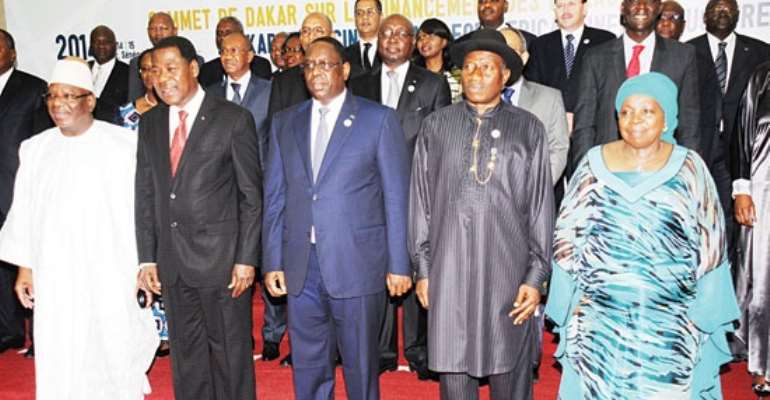.AU Summit: Jonathan seeks alternative sources of infrastructure financing

President Goodluck Jonathan said yesterday that the African continent has reached a stage where it would no longer rely solely on budgetary resources to finance the development of infrastructure.
He stated this at the opening session of the African Union's Summit on Financing Infrastructure Development held in Dakar, Senegal.
The summit convened by President Macky Sall of the Republic of Senegal and Chairperson of the NEPAD heads of state and government orientation committee has the theme, 'Leveraging Public-Private Partnerships for continental infrastructure transformation'.
President Jonathan who noted in his remarks the summit was convened to draw from country experiences in identifying various ways of mobilising financial resources required to fix Africa's infrastructure gap said in Nigeria, his administration was mobilising domestic financial resources for infrastructure development.
He listed some examples of such techniques to include the Sovereign Wealth Fund, Pension Funds, issuance of Dedicated Infrastructure Bonds, establishment and capitalisation of the Infrastructure Bank and the use of Public Private Partnerships.
Noting that the country was facing some challenges including inadequate technical expertise.
He said,'At the regional and continental level, the difference in legal and regulatory systems and standards across countries is also an issue. We are well positioned to take specific measures to address these challenges. Our economic fundamentals are strong. The performance of our shock market is among the best globally. The yields and prices of our domestic and foreign bonds are favourable.
'Going forward, the experiences that will be shared by different countries at this summit and lessons learned from the deliberations and panel discussions should provide key inputs into the planning, design and implementation of future infrastructure projects'.
To achieve success, the Nigerian president who observed that projects would require proper planning and funding said Nigeria would exploit innovative ways to attract private sector participation as well as further strengthen and expand enabling regulatory and legal frameworks to encourage the development of local consortia to take on big-ticket projects.
The World Bank applauded the Nigerian government for the successful completion of the power sector privatisation, saying it was a feat which other African countries must emulate.
It also commended the present administration for investing proceeds from partial removal of fuel subsidy on infrastructure development among other sectors.
Vice President Africa of the World Bank, Mr. Mukhtar Diop who stated this listed some infrastructure achievements across Africa, saying the electric reforms was one of the ways of solving Africa's problems by Africans.
'We must commend the leadership in Nigeria for the successful completion of the privatisation of the country's power sector. The electric reforms in that country is one of the ways of solving Africa's problems by Africans. We commend the country for that', Diop said.
Also speaking, President of African Development Bank Group, Dr. Donald Kaberuka commended President Jonathan for the partial removal of subsidy and for using the money saved on infrastructure and education among others.
He said, 'A lot still needs to be done. Energy has remained the main problem in almost all the African countries. We however commended President Goodluck Jonathan for the partial removal of subsidy and using the saved fundon education, infrastructure etc. We urge other African leaders to borrow a leaf from him in this regard'.
